'I come back to France to say hello to comrades who didn't make it home'
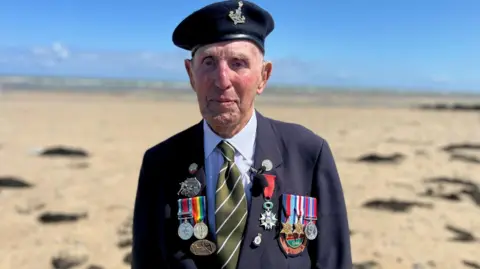 Olivia Richwald/BBC
Olivia Richwald/BBCAged 99, D-Day veteran Ken Cooke has outlived almost every comrade but refuses to be called a hero. To mark the 80th anniversary of VE Day, he has returned to France to tell his story in the hope the sacrifice made by his generation is never forgotten.
"I've come to see my friends who didn't come home," says Ken, as he pauses at a row of white headstones.
Hermanville War Cemetery, near Sword Beach, is the final resting place of more than 900 men who died on D-Day and in the weeks that followed.
Ken doesn't remember the names or the faces of many he fought beside, they didn't know each other for long in the noisy, bloody and shocking days that followed the Normandy invasion on 6 June, 1944.
About 11,000 British troops were killed and 54,000 more were wounded in the battles to re-enter the continent.
Ken says: "I'm very lucky because I've had an extra 80 years of life compared to these fellas.
"It upsets me when I think about it. I come to say hello, see how they are going on kind of thing."
I first met Ken 11 years ago, when I accompanied seven veterans from York who were heading to Normandy for the 70th anniversary of D-Day. Now Ken is the last of the "Magnificent Seven" who can still give a first-hand account of the horrors of World War Two.
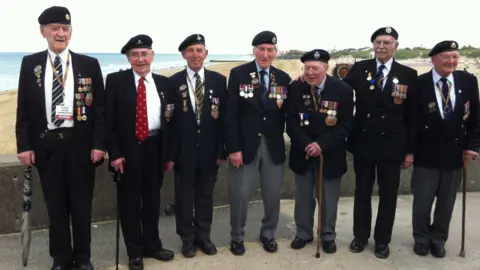 Olivia Richwald/BBC
Olivia Richwald/BBCAt Gold Beach, where Ken landed aged 18, he recalls what he saw: "All we could see of the beach was the dust, smoke and some fires as well.
"I can't explain why, but I was leaning over the side of the landing craft just watching all the fireworks.
"Rockets going, battleships firing, artillery firing from the bigger landing craft, the sergeants and the corporals were shouting get off the beaches as quick as we can. They said if anybody falls down or gets shot leave them."
Ken is remarkable, even aged 99 he walks without a stick, has an excellent memory and a cheeky sense of humour.
He turned down an invitation from Buckingham Palace to come here to Normandy for VE Day. He is the guest of honour on a battlefield coach tour.
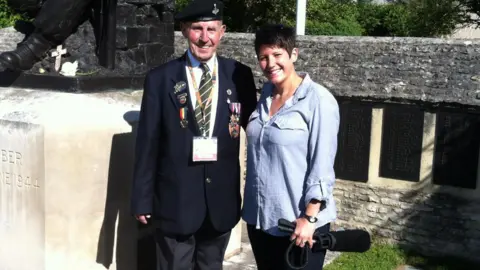
The 34 passengers won a newspaper competition to be here with Ken. They listen in awe on Gold Beach as the freezing wind sends hats and hairdos flying as he tells his story.
Ken remembers feeling exciting not scared, this was "a bit of an adventure".
It was the first time he had ever been on a boat. His abiding memory is the shock of wet socks as he stepped off the landing craft as part of the second wave of troops. It was only the morning after he realised just how serious it was.
"We looked around at breakfast and someone said, 'where's Tommy? Where's Geordie? Where is so and so?," he says.
"There is a row of graves in Bayeux where there is 12 Green Howards (Ken's regiment) all in a row and I have stood there and I have cried because I could have been one of those - just as simple as that."
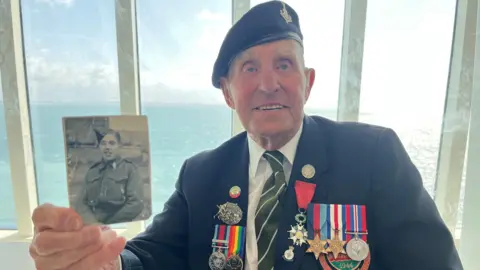 Olivia Richwald/BBC
Olivia Richwald/BBCKen was badly wounded by a mortar bomb after about four weeks in Normandy and was airlifted home.
It's likely this saved his life. By September many of the Green Howards had been wiped out in the push towards Arnhem in the Netherlands.
Ken sits at the front of the coach for the five- day battlefield tour and readily takes the mic to add extra insight alongside the guide Leger Battlefield Tour guide, Ben Mayne.
Ben says it is an "honour" to accompany Ken on this pilgrimage. "It's a very poignant time to come to France for the Victory in Europe liberation.
"Ken's memories have been brilliant. When he says he was more concerned about getting his feet wet than the Germans firing at him, it's amazing to hear those stories. We are never going to forget this.
"I am sure that we will always remember them. It's so important the younger generation hear Ken's story to ensure this never happens again."
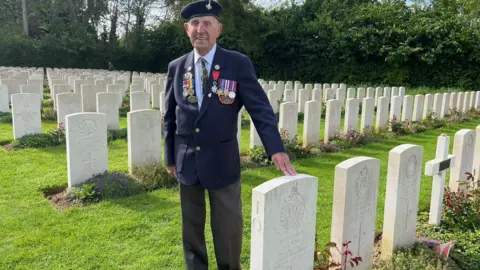 Olivia Richwald/BBC
Olivia Richwald/BBCKen wears his uniform, medals and his cap badge proudly throughout the trip and at each stop he is thanked and asked for photos and handshakes. He never says no and always has a joke or a smile.
Ken has become a symbol of generation we are losing, did we ever thank them enough? I ask if he enjoys the attention.
"I do, I feel a kind of happiness that these people would want to shake my hand which tells me I have done something," he says, then adds with a cheeky smile, "I should be charging, if I was I'd be on my yacht!"
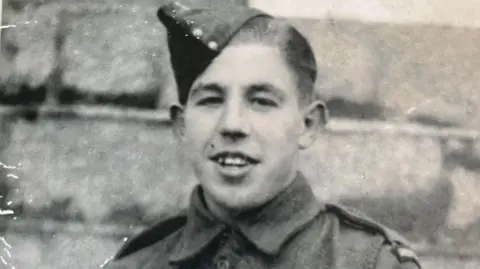 Ken Cooke
Ken CookeAfter recovering from injury in Normandy, Ken was deemed fit to serve once again and sent to Belgium where he joined the Highland Light Infantry and spent several months pushing across the Rhine into Germany.
Near Bremen, Ken's war journey ended. He had shell shock, now called PTSD, and was sent home in spring 1945. Ken was in hospital when VE Day was declared and the excitement of it all passed him by.
He returned home to York, was given two weeks leave, then life returned to normal. It would be 40 years before Ken spoke about his war experiences.
His son Stephen was 30 when he first learned of his father's heroism. He is incredibly proud.


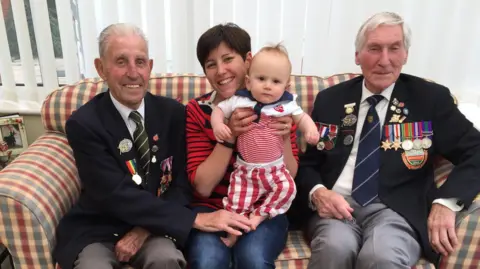
"Dad loves to come back, he becomes very emotional but it's also enjoyable. It's nice to see the respect people here in France have for all the veterans.
"It's very difficult for me to think what dad was doing on D-Day, when he was 18 and then I think what I was doing when I was 18 and there is no comparison."
For me personally, Ken reminds me of my grandfathers both of whom served in World War Two. Both died many years ago but I have been able to ask Ken questions I wish I could have asked them.
And when I give Ken a hug at the end of this trip and say "Thank you for everything you did", I'll also be thanking my grandfathers and all those who put the country and our future freedom first.
Ken will turn 100 in August. I ask if this be his last trip back to Normandy to relive the moments which became a pivotal moment in world history?
He looks at me and laughs: "I might come back again, it would be a wonderful experience… if I keep taking my tablets I probably will."
Listen to highlights from North Yorkshire on BBC Sounds, catch up with the latest episode of Look North.
